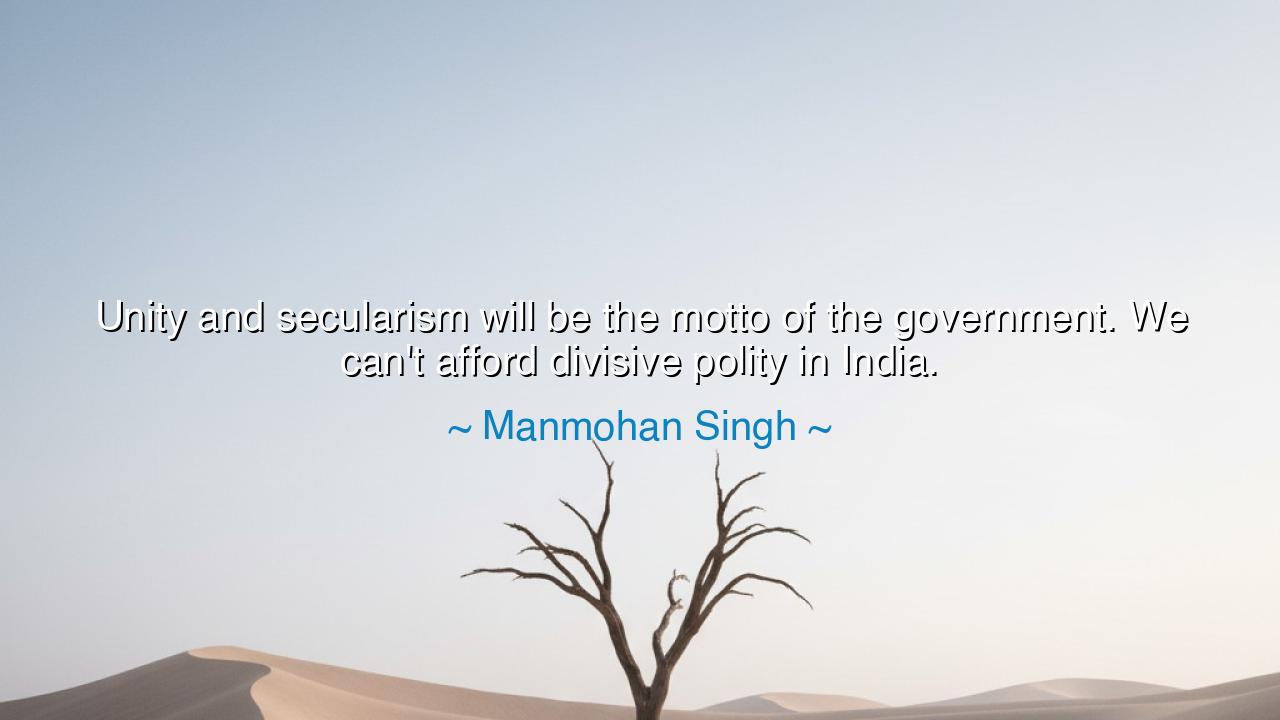
Unity and secularism will be the motto of the government. We
Unity and secularism will be the motto of the government. We can't afford divisive polity in India.






"Unity and secularism will be the motto of the government. We can't afford divisive polity in India." Thus declared Manmohan Singh, a statesman of calm strength and quiet dignity. His words ring with the wisdom of one who has witnessed both the splendor and sorrow of a vast civilization. In them lies a truth older than any constitution: that the soul of India, like the sacred rivers that flow through her heart, draws its strength not from one source, but from the confluence of many. Unity and secularism—these were not mere policies to him, but living principles, the lifeblood of a nation whose diversity is both its beauty and its burden.
From the beginning of time, India has been a land of a thousand tongues and countless gods. Its fields and cities have echoed with the hymns of many faiths, the philosophies of many minds. Yet beneath these differences runs a single current—the belief that truth may wear many faces, yet remain one in essence. To govern such a land requires not the iron fist of uniformity, but the open hand of understanding. Manmohan Singh, like the sages of old, knew that the strength of the nation lay not in sameness, but in harmony—a unity that celebrates difference rather than erasing it.
But these words were born in an age of trial. The fires of division had scorched the land before, and their embers still glowed beneath the surface. From the Partition of 1947, when brothers turned against brothers, to the communal strife that scarred cities in later years, the lesson of history stood plain: that when sectarianism rises, the nation bleeds. Singh’s call for secularism was not a denial of faith, but a protection of it—an assurance that every soul, whatever creed it carries, may walk the earth with equal dignity.
In the annals of India’s history, one may recall the reign of Emperor Akbar, who centuries before understood this same truth. Though born a Muslim ruler, Akbar reached beyond the walls of his own tradition and built a court where men of every faith could speak freely. He abolished discriminatory taxes and welcomed philosophers, priests, and poets alike, knowing that a ruler who listens to all stands closer to justice. His policy of sulh-i-kul, or “peace with all,” became the seed of what later generations would call secularism. In this spirit, Manmohan Singh’s words carried the same ancient resonance—a call to guard that sacred equilibrium once again.
Unity, in Singh’s vision, is not mere silence between conflicts, but the active pursuit of understanding. It is a bridge built daily—through dialogue, through compassion, through the courage to see humanity beyond the labels of caste, creed, or tongue. For a nation as vast as India, unity must be forged not in dominance, but in mutual respect. Without it, the very fabric of democracy begins to fray, and the promise of freedom turns hollow. A divisive polity—a government or people split by hatred—invites ruin upon itself, for no wall built between hearts can stand forever.
The meaning of Singh’s words, therefore, transcends the boundaries of time and place. It speaks to every generation that inherits a land rich in difference and burdened by memory. Secularism, rightly understood, is not the absence of religion, but the presence of justice; not a cold neutrality, but a warm embrace of all faiths under one sun. And unity is the strength to see oneself in the other—to know that harm done to one community wounds the whole nation’s spirit.
The lesson is clear, and it shines with the light of timeless wisdom: a nation divided by prejudice cannot stand, but a nation united in compassion can endure any storm. The call, then, is to act—not with slogans or symbols, but with deeds. Let every citizen strive to build bridges where walls once stood. Let them speak truth against hatred, offer help where suspicion festers, and remember that patriotism is not love for one’s own kind alone, but for all who share the soil.
So let the words of Manmohan Singh be remembered not as a speech, but as a sacred vow: that India shall remain one, not by force, but by faith in her people; not through sameness, but through respect for all. For when unity and secularism stand side by side, they form the twin pillars of a civilization that can never fall.






AAdministratorAdministrator
Welcome, honored guests. Please leave a comment, we will respond soon